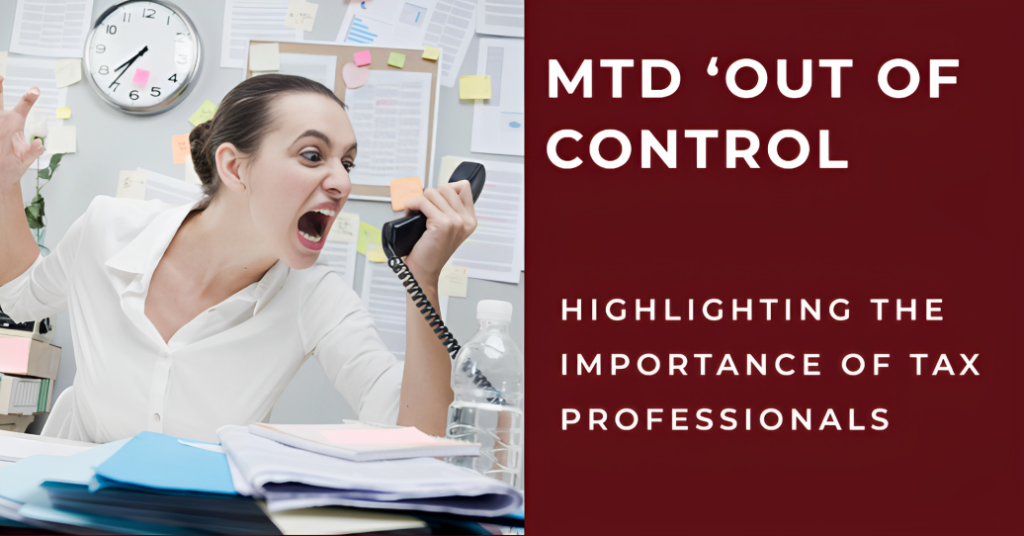Tax Digital (MTD) implementation has gained much attention from tax experts and small business owners in recent years. Through digital record-keeping and online submissions, tax authorities have launched the MTD project to modernize and streamline tax procedures.
Meanwhile, tax experts are voicing worries about implementing MTD, stating that it is spiraling “out of control.” This essay will explore the difficulties tax professionals face, the effects on small businesses, and the requirement for streamlined MTD processes.
Understanding MTD
A government effort called MTD seeks to modernize the tax system by digitizing tax records and requiring firms to file their taxes electronically. Businesses must use software to file tax returns and maintain digital records of their income and expenses under MTD. The objective is to increase compliance, decrease errors, and increase tax administration efficiency.
Challenges Faced by Tax Professionals
Despite the potential benefits of MTD, tax professionals have encountered several challenges during its implementation. One major concern is the complexity and frequent changes in MTD regulations and requirements.
Tax professionals must stay updated with the latest guidelines, which can be time-consuming and overwhelming. Moreover, transitioning from traditional record-keeping methods to digital systems requires training and adaptation, posing a challenge for professionals not well-versed in technology.
MTD Impact on Small Businesses
Particularly small firms have been impacted by the deployment of MTD. Many owners of small businesses lack the tools and knowledge required to understand the complexity of digital tax systems. These organizations are further burdened by the extra expenses of purchasing digital equipment and software. Small business owners are especially anxious and perplexed due to the worry of non-compliance penalties and the possibility of making mistakes in digital submissions.
The Need for Streamlined Processes For MTD
There is a pressing need for streamlined processes to address the challenges and concerns surrounding MTD. Tax authorities must ensure the regulations and guidelines are clear, consistent, and accessible to tax professionals and business owners. Simplifying the compliance process and providing user-friendly digital tools can alleviate the burden on tax professionals and small businesses.
Discover how to navigate MTD with ease – Schedule a consultation today!
Embracing Digital Solutions
One way to mitigate the challenges of MTD is for tax professionals and businesses to embrace digital solutions. This involves adopting user-friendly accounting software that integrates with tax systems, automating data entry processes, and leveraging cloud-based platforms for secure data storage. Tax professionals can enhance their operations’ efficiency, accuracy, and compliance by embracing these technologies.
Benefits of MTD Implementation
Despite the initial hurdles, the implementation of MTD offers several benefits. Digital record-keeping and real-time tax updates give businesses better visibility of their financial position. It allows for more accurate tax calculations, minimizing the risk of errors and penalties. Additionally, MTD provides a streamlined process for submitting tax returns, saving tax professionals and businesses time and resources.
Ensuring Compliance and Accuracy
Tax professionals play a crucial role in ensuring compliance and accuracy in MTD. They must stay informed about the latest regulations, guide businesses, and offer assistance in implementing digital solutions.
Tax professionals can also conduct regular reviews and audits to identify discrepancies and rectify them promptly. Tax professionals can help businesses successfully navigate MTD’s complexities by maintaining a proactive approach.
The Role of Tax Professionals
Tax professionals are pivotal in bridging the gap between tax authorities and businesses. Their expertise and knowledge are essential in guiding businesses to transition to digital tax systems.
Tax professionals can offer training and support to ensure businesses understand their obligations and maximize the available digital tools. By providing personalized advice and assistance, tax professionals can help businesses thrive in the era of MTD.
Overcoming Resistance to Change
Resistance to change is a frequent barrier when establishing any new system or procedure. Educating and informing businesses about the advantages and necessity of digital tax systems is essential to overcoming resistance to MTD.
Businesses may be more likely to move if there is clear communication about the changes, their effects, and the available support services. Collaboration between tax authorities, business associations, and tax specialists can also help MTD adoption go more smoothly.
Buy-to-Let Investments: A Guide for Real Estate Investors
Conclusion
MTD has the potential to revolutionize tax processes and bring numerous benefits to businesses and tax authorities. However, tax professionals and small businesses challenges during its implementation should not be overlooked.
By addressing these challenges, streamlining processes, and embracing digital solutions, MTD can fulfill its promise of enhancing efficiency and accuracy in tax administration. With the guidance and support of tax professionals, businesses can successfully navigate the complexities of MTD and adapt to the digital age of taxation.
Streamline your tax processes with digital solutions – Take the first step now!









